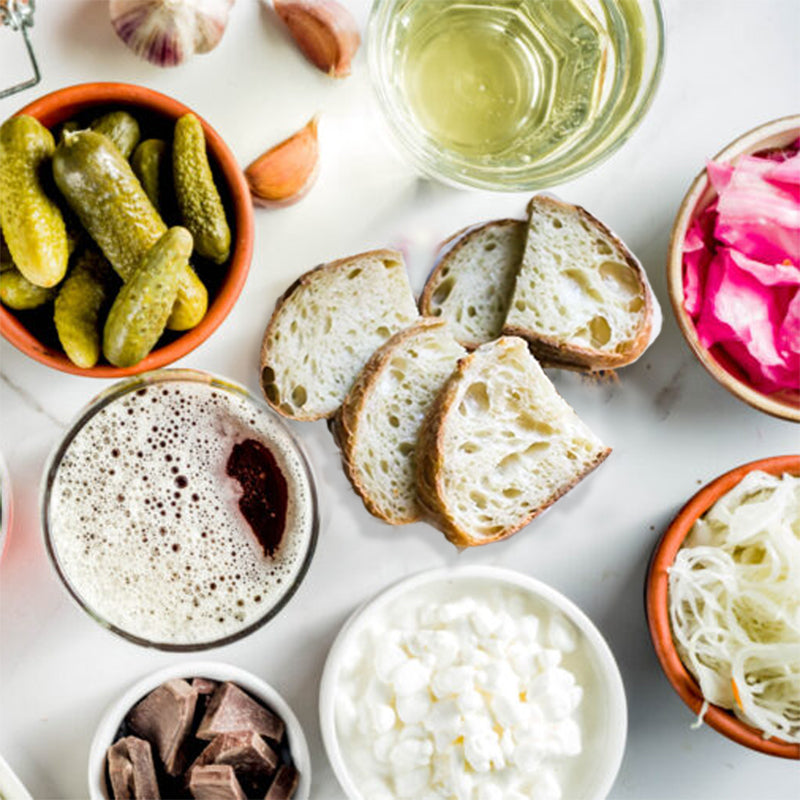
The timer beeps and you pull out another perfectly delicious loaf of homemade sourdough bread made from a real starter. You know its delicious, but you know its also healthy for you. However, all the probiotics (the bacteria and yeast) died a fiery death in the oven. If it's not the probiotics that make cooked sourdough bread healthy, then what is it? When it comes to sourdough and other cooked probiotic foods, it's not the probiotics that make them healthy, rather its something that's called 'paraprobiotics', which is basically the dead by-products of probiotics.
Most people have heard of prebiotics and probiotics and the subsequent benefits of both. But there’s another category called “paraprobiotics” that is newly studied. Incredibly it may be just as important as prebiotics and probiotics. But first, a quick refresher on what prebiotics and probiotics are.
Prebiotics
Prebiotics are non-digestible food ingredients that stimulate the growth and activity of beneficial microorganisms in the gut. They can be found naturally in a variety of plant-based foods, such as whole grains, legumes, vegetables, and fruits. Prebiotics are thought to promote gut health by supporting the growth of beneficial bacteria, which can help maintain a healthy balance of microorganisms in the gut and support the immune system.
Probiotics
Probiotics are live microorganisms that are intended to have a beneficial effect on the health of the host when consumed in sufficient quantities. Probiotics are often found in fermented foods such as fermented veggies and kefir. Probiotics are believed to have various health benefits, including improving digestion, boosting the immune system, and promoting overall well-being.
What are paraprobiotics?
In contrast to probiotics, paraprobiotics are non-living microorganisms (cooked probiotics) and its also the by-products of the once living probiotics. Paraprobiotics can include a range of non-living microbial products, such as microbial metabolites (compounds produced by microorganisms), enzymes and proteins.
Cultures around the world have been cooking their fermented foods for centuries. Even though the live cultures do not survive a hot pot or an oven, the benefits of are still there.
Benefits of paraprobiotics
There is limited research on the potential benefits of paraprobiotics, as they are a relatively new area of study. Some of the potential benefits that have been proposed include:
- Supporting gut health: Like probiotics, paraprobiotics may be able to help restore the balance of bacteria in the gut and support overall gut health.
- Boosting the immune system: Some research suggests that paraprobiotics may be able to help boost the immune system by stimulating the production of antibodies and activating immune cells.
- Reducing the risk of certain infections: Some studies have suggested that paraprobiotics may be able to reduce the risk of certain infections, such as respiratory tract infections and urinary tract infections.
- Improving digestive symptoms: Some people may find that paraprobiotics help improve digestive symptoms such as bloating, gas, and constipation.
- People who are sensitive to probiotics, may be able to consume paraprobiotics instead and still get similar benefits.
Is kombucha a paraprobiotic?
Surprisingly yes. Kombucha is known for its healing and cleansing properties, however, there's actually very little probiotics left after a typical kombucha ferment. What's left is mostly the by-products of an active ferment. Different to kefir, but still definitely healthy in its own right.
Bottom line
Companies are trying to add probiotics or live cultures to everything these days. Lab created cultures will never be as healthy and potent as naturally occurring probiotics that you find in kefir or fermented veggies. As healthy as probiotics are, it's only one part of the story. Paraprobiotics (dead probiotics or the by-products of once living probiotics) may be just as healthy. Research is in it's infancy when it comes to paraprobiotics, but it's showing incredible health benefits already. Suffice it to say, you can happily consume foods that cook or kill the probiotics and know that there are still benefits. It's good to consume raw kefir filled with all those beneficial probiotics, but don't be afraid to cook with the whey. Eat that delicious raw sauerkraut or throw it in hot soup, either way, its still good for you.


Leave a comment